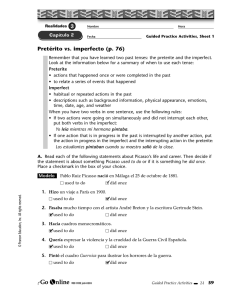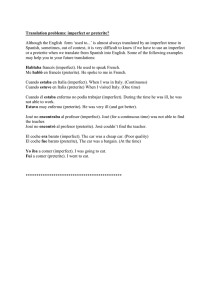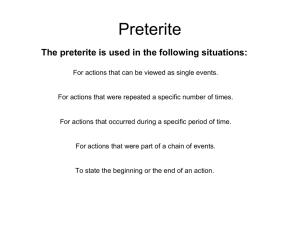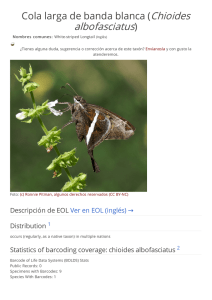el imperfecto vs. el pretérito Comparaciones entre el imperfecto y el
Anuncio
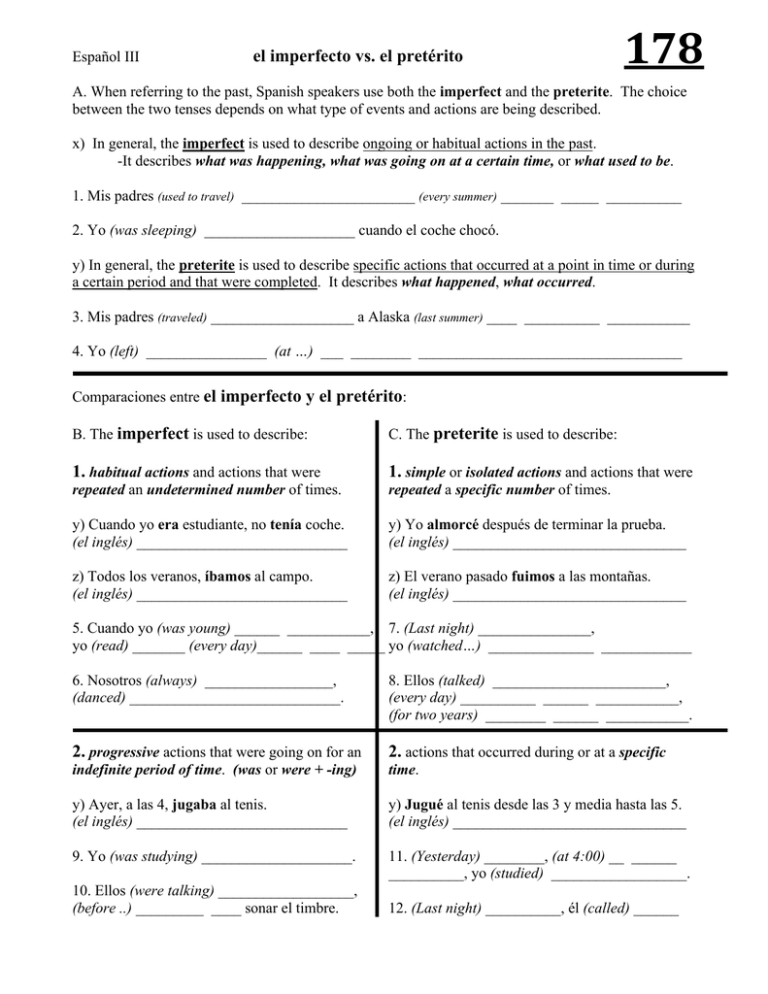
Español III el imperfecto vs. el pretérito 178 A. When referring to the past, Spanish speakers use both the imperfect and the preterite. The choice between the two tenses depends on what type of events and actions are being described. x) In general, the imperfect is used to describe ongoing or habitual actions in the past. -It describes what was happening, what was going on at a certain time, or what used to be. 1. Mis padres (used to travel) _______________________ (every summer) _______ _____ __________ 2. Yo (was sleeping) ____________________ cuando el coche chocó. y) In general, the preterite is used to describe specific actions that occurred at a point in time or during a certain period and that were completed. It describes what happened, what occurred. 3. Mis padres (traveled) ___________________ a Alaska (last summer) ____ __________ ___________ 4. Yo (left) ________________ (at …) ___ ________ ___________________________________ Comparaciones entre el imperfecto y el pretérito: B. The imperfect is used to describe: C. The preterite is used to describe: 1. habitual actions and actions that were 1. simple or isolated actions and actions that were repeated an undetermined number of times. repeated a specific number of times. y) Cuando yo era estudiante, no tenía coche. (el inglés) ____________________________ y) Yo almorcé después de terminar la prueba. (el inglés) _______________________________ z) Todos los veranos, íbamos al campo. (el inglés) ____________________________ z) El verano pasado fuimos a las montañas. (el inglés) _______________________________ 5. Cuando yo (was young) ______ ___________, 7. (Last night) _______________, yo (read) _______ (every day)______ ____ _____ yo (watched…) ______________ ____________ 6. Nosotros (always) _________________, (danced) ____________________________. 8. Ellos (talked) _______________________, (every day) __________ ______ ___________, (for two years) ________ ______ ___________. 2. progressive actions that were going on for an 2. actions that occurred during or at a specific indefinite period of time. (was or were + -ing) time. y) Ayer, a las 4, jugaba al tenis. (el inglés) ____________________________ y) Jugué al tenis desde las 3 y media hasta las 5. (el inglés) _______________________________ 9. Yo (was studying) ____________________. 11. (Yesterday) ________, (at 4:00) __ ______ __________, yo (studied) __________________. 10. Ellos (were talking) __________________, (before ..) _________ ____ sonar el timbre. 12. (Last night) __________, él (called) ______ (178 de atrás) imperfect 3. the background and circumstances of preterite 3. main actions and events a main action, for example: a) time and weather b) age; outward or physical appearance c) feelings, beliefs, emotional states d) other external circumstances and actions in progress y) Eran las dos de la tarde y hacía calor. (el inglés) ___________________________ y) Fuimos a la piscina. (el inglés) ______________________________ 1. (It was 7:00) ________ _____ __________ 8. Yo (left) _____________ de la casa. 2. (It was cold.) ___________ ___________. 9. Mis padres (arrived) ____________________. 3. Yo (was 12 years old) ___________ ________ 10. Mis padres (moved) _____ ________________ ________. Yo (was) ___________ bajo. a California. 4. Ella (was sick) ____________ ____________ 11. Ella (went) ___________ a su casa. 5. Yo (felt tired) _____ ___________ _________ 12. Yo (went to bed) ______ _______________. 6. Elena (was) _________ muy idealista y (wanted to help) ____________ ___________ a todos. 13. Ella (gave) __________ todo su dinero (to the poor) ___ _______ _______________. 7. Él (was handsome) ________ ____________. Él (was 20 years old) __________ 20 ________. Él (was tall) __________ ____________. Él (was wearing) ________________ una corbata. 14. Él (didn’t see me) _____ _____ __________. 15. Él (left) _______________ y (didn’t talk to me) ______ ______ _______________. D. When using the imperfect and preterite together, in the same sentence, the preterite is the specific, completed action. It’s done and over with. The imperfect is the descriptor tense (ongoing or progressive action), it describes what was happening when ¡whamo! the preterite happened. [Underline imperfect; circle preterite] x) Mis padres dormían cuando yo volví a la casa. (el inglés) My parents were ____________ when I ___________ home. y) Cuando hablábamos, el profesor entró en la clase. (el inglés) When we were ________, the teacher _______ the class. z) Yo jugaba al béisbol, cuando mi madre me gritó. (el inglés) _______________________________________________ 16. Nosotros (were playing) _______________________ el piano, cuando mi padre (turned on) _______________ la tele. 17. Yo (was studying) ___________________________ cuando mi amigo (called me) ______ ____________________. 18. Cuando tú (arrived) _______________________ a mi casa, yo (was sleeping) _______________________________. 19. Yo (was) ______________________ en mi cuarto, cuando mis padres (came) __________________________ a casa. 20. (It was cold and raining) _______________ ___________ y ________________ cuando él (fell) ________________.
